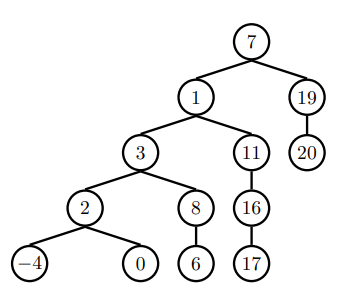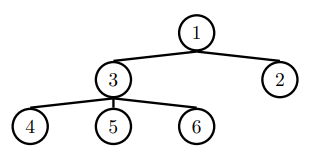class: list <style>code{color: #a7e7f2;}</style> # welcome to discussion 5! Announcements: - Homework 4 (big!) is due Thursday 3/5 @ 11:59pm. - Revise Hog Composition by Tuesday 3/3. - Sign in: **links.cs61a.org/addison-attendance** - Feedback: **links.cs61a.org/addison-feedback** Schedule: - Trees (ADT) - Height - Square Tree or Find Path - Abstraction - Mutation - WWPD - Add This Many - (Group By) - Quiz --- class: title # trees --  -- ← demo --- class: list # tree summary - Parts of a tree: - Root: the top-most element of a tree. - Branches: the "children" of some node. - Functions for trees: - `label(tree)`: returns the _value_ at the **root node** of a tree. - `branches(tree)`: returns the _branches_ of the **root node** of a tree. - `is_leaf(tree)`: returns whether a tree is a **leaf**, meaning it _has no children_. - Properties of a tree: - Depth: how far away some particular node is from the root node. Note that depth of the root node is 0. - Height: the _max depth_ of any subnode from the root node. Constructor: ```python def tree(label, branches=[]) ``` --- class: title # practice: make this tree  -- ```python t = tree(1, [tree(3, [tree(4), tree(5), tree(6)]), tree(2)]) ``` --- class: title # height -- ```python def height(t): if is_leaf(t): return 0 return 1 + max([height(branch) for branch in branches(t)]) ``` --- class:title # height ```python def height(t): return 1 + max([height(branch) for branch in branches(t)]) ``` --- class: title # vote: medium or hard problem? --- class: title # square tree -- ```python def square_tree(t): sq_branches = [square_tree(branch) for branch in branches(t)] return tree(label(t)**2, sq_branches) ``` --- class: title # find path -- ```python def find_path(tree, x): if label(tree) == x: return [label(tree)] for b in branches(tree): path = find_path(b, x) if path: return [label(tree)] + path ``` --- class: list # abstractions Main idea: Use **functions** (namely, **constructors** and **selectors**) to work with types that you didn't design. With abstractions, we assume the implementation is correct, so we don't have to worry about _how it works_, only about _how to use it_. --- class: list # example ```python def student(name, year): return [name, year] def get_name(student): return student[0] ``` -- ```python >>> addison = student("add", 2) >>> get_name(addison) "add" >>> addison[0] "add" ``` -- ```python def student(name, year): return {"name": name, "year": year} def get_name(student): return student["name"] ``` -- ```python >>> addison = student("add", 2) >>> get_name(addison) "add" >>> addison[0] # --> ? ``` --- class: list # example ```python def student(name, year): return [name, year] def get_name(student): return student[0] ``` ```python >>> addison = student("add", 2) >>> get_name(addison) "add" >>> addison[0] "add" ``` ```python def student(name, year): return {"name": name, "year": year} def get_name(student): return student["name"] ``` ```python >>> addison = student("add", 2) >>> get_name(addison) "add" >>> addison[0] Error ``` --- class: title # adt problems --- class: list # mutation 1. `my_list.append(elem)`: adds `elem` to the end of `my_list`. Returns `None`. 1. `my_list.extend(lst)`: adds all elements from `lst` to the end of `my_list` (ie. _concatenates_ the two lists). Returns `None`. 1. `my_list.insert(i, elem)`: adds `elem` to `my_list` at position `i`. (The items in the list get pushed down by 1 value.) Returns `None`. 1. `my_list.remove(elem)`: removes first occurrence of `elem`. 1. `my_list.pop(index)`: removes element at position `index` from `my_list`. Returns **the removed element**. Also, we can use assignment: ```python >>> my_list = ['a', 'b', 'c'] >>> my_list[0] = 'd' >>> my_list ['d', 'b', 'c'] ``` --- class: list # == and is A quick note on `==` vs `is`: - `==`: compares whether two arguments are equal _in value_. - `is`: compares whether two arguments point to the same object. **This helps us understand how modifications to lists work! If two variables point to the same list, mutating one also mutates the other!** --- class: title # wwpd --- class: title # add this many -- ```python def add_this_many(x, el, lst): count = 0 for element in lst: if element == x: count += 1 while count > 0: lst.append(el) count -= 1 ``` -- Can we use these instead of `lst.append(el)`? - `lst.extend([el])` - `lst += [el]` - `lst = lst + [el]` --- class: title # (group by) -- ```python def group_by(s, fn): grouped = {} for x in s: key = fn(x) if key in grouped: grouped[key].append(x) else: grouped[key] = [x] return grouped ```